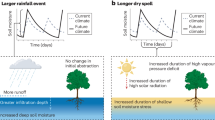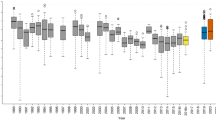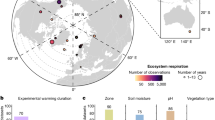Abstract
Ecosystem respiration is the biotic conversion of organic carbon to carbon dioxide by all of the organisms in an ecosystem, including both consumers and primary producers. Respiration exhibits an exponential temperature dependence at the subcellular and individual levels1, but at the ecosystem level respiration can be modified by many variables2,3,4 including community abundance and biomass5, which vary substantially among ecosystems6. Despite its importance for predicting the responses of the biosphere to climate change, it is as yet unknown whether the temperature dependence of ecosystem respiration varies systematically between aquatic and terrestrial environments. Here we use the largest database of respiratory measurements yet compiled to show that the sensitivity of ecosystem respiration to seasonal changes in temperature is remarkably similar for diverse environments encompassing lakes, rivers, estuaries, the open ocean and forested and non-forested terrestrial ecosystems, with an average activation energy similar to that of the respiratory complex3 (approximately 0.65 electronvolts (eV)). By contrast, annual ecosystem respiration shows a substantially greater temperature dependence across aquatic (approximately 0.65 eV) versus terrestrial ecosystems (approximately 0.32 eV) that span broad geographic gradients in temperature. Using a model5 derived from metabolic theory7, these findings can be reconciled by similarities in the biochemical kinetics of metabolism at the subcellular level, and fundamental differences in the importance of other variables besides temperature—such as primary productivity and allochthonous carbon inputs—on the structure of aquatic and terrestrial biota at the community level.
This is a preview of subscription content, access via your institution
Access options
Subscribe to this journal
Receive 51 print issues and online access
$199.00 per year
only $3.90 per issue
Buy this article
- Purchase on Springer Link
- Instant access to full article PDF
Prices may be subject to local taxes which are calculated during checkout


Similar content being viewed by others
References
Gillooly, J. F., Brown, J. H., West, G. B., Savage, V. M. & Charnov, E. L. Effects of size and temperature on metabolic rate. Science 293, 2248–2251 (2001)
Mahecha, M. D. et al. Global convergence in the temperature sensitivity of respiration at ecosystem level. Science 329, 838–840 (2010)
Gu, L., Hanson, P. J., Mac Post, W. & Liu, Q. A novel approach for identifying the true temperature sensitivity from soil respiration measurements. Glob. Biogeochem. Cycles 22, GB4009 (2008)
Luo, Y. Terrestrial carbon-cycle feedback to climate warming. Ann. Rev. Ecol. Evol. System. 38, 683–712 (2007)
Allen, A. P., Gillooly, J. F. & Brown, J. H. Linking the global carbon cycle to individual metabolism. Funct. Ecol. 19, 202–213 (2005)
Cebrian, J. Patterns in the fate of production in plant communities. Am. Nat. 154, 449–468 (1999)
Brown, J. H., Gillooly, J. F., Allen, A. P., Savage, V. & West, G. B. Toward a metabolic theory of ecology. Ecology 85, 1771–1789 (2004)
Pinheiro, J. & Bates, D. M. Mixed-Effects Models in S and S-PLUS (Springer, 2000)
Beer, C. et al. Terrestrial gross carbon dioxide uptake: global distribution and covariation with climate. Science 329, 834–838 (2010)
Raich, J. & Potter, C. S. Global patterns of carbon-dioxide emissions from soils. Glob. Biogeochem. Cycles 9, 23–36 (1995)
del Giorgio, P. A., Cole, J., Caraco, N. & Peters, R. Linking planktonic biomass and metabolism to net gas fluxes in northern temperate lakes. Ecology 80, 1422–1431 (1999)
del Giorgio, P. A. & Gasol, J. M. Biomass distribution in freshwater plankton communities. Am. Nat. 146, 135–152 (1995)
Gasol, J. M. & del Giorgio, P. A. Biomass distribution in marine planktonic communities. Limnol. Oceangr. 42, 1353–1363 (1997)
Pereira, J. S. et al. Net ecosystem carbon exchange in three contrasting Mediterranean ecosystems—the effect of drought. Biogeosciences 4, 791–802 (2007)
del Giorgio, P. A. & Williams, P. J. L. B. Respiration in Aquatic Ecosystems (Oxford Univ. Press, 2005)
Enquist, B. et al. Scaling metabolism from organisms to ecosystems. Nature 423, 639–642 (2003)
Dewar, R., Medlyn, B. & McMurtrie, R. Acclimation of the respiration photosynthesis ratio to temperature: insights from a model. Glob. Change Biol. 5, 615–622 (1999)
Yvon-Durocher, G., Jones, J. I., Trimmer, M., Woodward, G. & Montoya, J. M. Warming alters the metabolic balance of ecosystems. Philos. Trans. R. Soc. Lond. 365, 2117–2126 (2010)
Regaudie-de-Gioux, A. &. Duarte, C. M. Temperature dependence of planktonic metabolism in the ocean. Global Biogeochem. Cycles 26, GB1015 (2012)
Lopez-Urrutia, A., San Martin, E., Harris, R. P. & Irigoien, X. Scaling the metabolic balance of the oceans. Proc. Natl Acad. Sci. USA 103, 8739–8744 (2006)
Kesselmeier, J. et al. Volatile organic compound emissions in relation to plant carbon fixation and the terrestrial carbon budget. Global Biogeochem. Cycles 16, 1126 (2002)
Duarte, C. & Agusti, S. The CO2 balance of unproductive aquatic ecosystems. Science 281, 234–236 (1998)
Vargas, R. et al. Looking deeper into the soil: biophysical controls and seasonal lags of soil CO2 production and efflux. Ecol. Appl. 20, 1569–1582 (2010)
Chapin, S. F., Matson, P. A. & Mooney, H. A. Principles of Terrestrial Ecosystem Ecology (Springer, 2002)
Schlesinger, W. Evidence from chronosequence studies for a low carbon-storage potential of soils. Nature 348, 232–234 (1990)
Schimel, D. et al. Recent patterns and mechanisms of carbon exchange by terrestrial ecosystems. Nature 414, 169–172 (2001)
R. Development Core Team. R: A language and environment for statistical computing http://www.R-project.org/ (2011)
Savage, V. H. Improved approximations to scaling relationships for species, populations, and ecosystems across latitudinal and elevational gradients. J. Theor. Biol. 227, 525–534 (2004)
Acknowledgements
We wish to thank J. Cole, M. Pace, M. Reichstein and D. Baldocchi for helpful comments that greatly improved the manuscript. M. Mahecha, C. S. Hopkinson, E. Smith, C. Gudasz, C. Solomon, E. Gaiser, E. de Eyto, C.-Y. Chiu, D. Hamilton, S. Hendricks, R. Adrian, K. Rose, D. Bruesewitz, D. Richardson, M. Van de Bogert, FLUXNET and GLEON are gratefully acknowledged for supplying raw data. G.Y.-D., M.T. and G.W. acknowledge the support of the Natural Environment Research Council, UK (grant NE/F004753/1) for financial support. P.A.S. was funded by the Danish Council for Independent Research, Natural Sciences grant 10-085238 and the Danish Centre for Lake Restoration (CLEAR). J.P. acknowledges the Academy of Finland Centre of Excellence program (project number 218094) for funding. J.M.M. was supported by a Ramon y Cajal Fellowship (RYC-892 2008-03664), a Ministry of Economy grant (CGL2010-20091) and Generalitat de Catalunya grant (2009SGR142).
Author information
Authors and Affiliations
Contributions
G.Y.-D. and A.P.A. analysed the data, wrote the manuscript, and devised the research. A.C., J.M.C., M.D., P.d.G., J.M.G., J.M.M., J.P., P.A.S., M.T. and G.W. commented on the manuscript. G.Y.-D., A.P.A., P.d.G., J.M.M. and M.T. discussed ideas. A.C., J.M.C., M.D., P.d.G., J.P., M.T. and P.A.S. provided raw data.
Corresponding author
Ethics declarations
Competing interests
The authors declare no competing financial interests.
Supplementary information
Supplementary Information
This file contains Supplementary Text and Data; Supplementary Figures S1.1, S1.2, S8, S9, S10; Supplementary Tables S1.1, S1.2, S5, S7 and Supplementary References. (PDF 1844 kb)
Supplementary Data
This file contains the Supplementary Appendix. (XLS 1043 kb)
PowerPoint slides
Rights and permissions
About this article
Cite this article
Yvon-Durocher, G., Caffrey, J., Cescatti, A. et al. Reconciling the temperature dependence of respiration across timescales and ecosystem types. Nature 487, 472–476 (2012). https://doi.org/10.1038/nature11205
Received:
Accepted:
Published:
Issue Date:
DOI: https://doi.org/10.1038/nature11205
This article is cited by
-
Thermal responses of dissolved organic matter under global change
Nature Communications (2024)
-
Relative increases in CH4 and CO2 emissions from wetlands under global warming dependent on soil carbon substrates
Nature Geoscience (2024)
-
Biome-scale temperature sensitivity of ecosystem respiration revealed by atmospheric CO2 observations
Nature Ecology & Evolution (2023)
-
Universal temperature sensitivity of denitrification nitrogen losses in forest soils
Nature Climate Change (2023)
-
The temperature dependence of microbial community respiration is amplified by changes in species interactions
Nature Microbiology (2023)
Comments
By submitting a comment you agree to abide by our Terms and Community Guidelines. If you find something abusive or that does not comply with our terms or guidelines please flag it as inappropriate.



